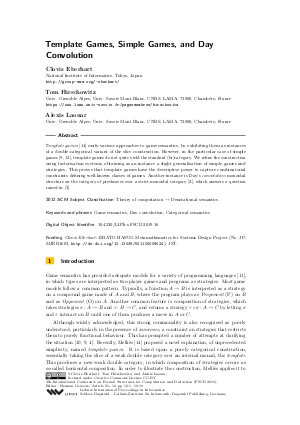Template Games, Simple Games, and Day Convolution
Authors Clovis Eberhart, Tom Hirschowitz, Alexis Laouar
-
Part of:
Volume:
4th International Conference on Formal Structures for Computation and Deduction (FSCD 2019)
Part of: Series: Leibniz International Proceedings in Informatics (LIPIcs)
Part of: Conference: Formal Structures for Computation and Deduction (FSCD) - License:
 Creative Commons Attribution 3.0 Unported license
Creative Commons Attribution 3.0 Unported license
- Publication Date: 2019-06-18
File

PDF
LIPIcs.FSCD.2019.16.pdf
- Filesize: 0.51 MB
- 19 pages
Document Identifiers
Subject Classification
ACM Subject Classification
- Theory of computation → Denotational semantics
Keywords
- Game semantics
- Day convolution
- Categorical semantics
Metrics
- Access Statistics
-
Total Accesses (updated on a weekly basis)
0Document
0Metadata
Abstract
Template games [P.-A. Melliès, 2019] unify various approaches to game semantics, by exhibiting them as instances of a double-categorical variant of the slice construction. However, in the particular case of simple games [R. Harmer et al., 2007; C. Jacq and P.-A. Melliès, 2018], template games do not quite yield the standard (bi)category. We refine the construction using factorisation systems, obtaining as an instance a slight generalisation of simple games and strategies. This proves that template games have the descriptive power to capture combinatorial constraints defining well-known classes of games. Another instance is Day’s convolution monoidal structure on the category of presheaves over a strict monoidal category [B. Day, 1970], which answers a question raised in [C. Eberhart, 2018].
Cite As Get BibTex
Clovis Eberhart, Tom Hirschowitz, and Alexis Laouar. Template Games, Simple Games, and Day Convolution. In 4th International Conference on Formal Structures for Computation and Deduction (FSCD 2019). Leibniz International Proceedings in Informatics (LIPIcs), Volume 131, pp. 16:1-16:19, Schloss Dagstuhl – Leibniz-Zentrum für Informatik (2019)
https://doi.org/10.4230/LIPIcs.FSCD.2019.16
BibTex
@InProceedings{eberhart_et_al:LIPIcs.FSCD.2019.16,
author = {Eberhart, Clovis and Hirschowitz, Tom and Laouar, Alexis},
title = {{Template Games, Simple Games, and Day Convolution}},
booktitle = {4th International Conference on Formal Structures for Computation and Deduction (FSCD 2019)},
pages = {16:1--16:19},
series = {Leibniz International Proceedings in Informatics (LIPIcs)},
ISBN = {978-3-95977-107-8},
ISSN = {1868-8969},
year = {2019},
volume = {131},
editor = {Geuvers, Herman},
publisher = {Schloss Dagstuhl -- Leibniz-Zentrum f{\"u}r Informatik},
address = {Dagstuhl, Germany},
URL = {https://drops.dagstuhl.de/entities/document/10.4230/LIPIcs.FSCD.2019.16},
URN = {urn:nbn:de:0030-drops-105237},
doi = {10.4230/LIPIcs.FSCD.2019.16},
annote = {Keywords: Game semantics, Day convolution, Categorical semantics}
}
Author Details
Funding
- Eberhart, Clovis: ERATO HASUO Metamathematics for Systems Design Project (No. JPMJER1603, http://dx.doi.org/10.13039/501100009024), JST.
References
-
A. K. Bousfield. Constructions of Factorization Systems in Categories. Journal of Pure and Applied Algebra, 9(2-3):287-329, 1977.

-
B. Day. On closed categories of functors. In Reports of the Midwest Category Seminar IV, volume 137 of Lecture Notes in Mathematics, pages 1-38. Springer, 1970.

-
C. Eberhart. Catégories et diagrammes de cordes pour les jeux concurrents. PhD thesis, Université Savoie Mont Blanc, 2018.

- C. Eberhart and T. Hirschowitz. What’s in a game?: A theory of game models. In Proc. 33rd Symposium on Logic in Computer Science, pages 374-383. ACM, 2018. URL: http://dx.doi.org/10.1145/3209108.3209114.
-
C. Ehresmann. Catégories structurées. Annales scientifiques de l'Ecole Normale Supérieure, 80(4):349-426, 1963.

-
R. Garner. Polycategories. PhD thesis, University of Cambridge, 2006.

-
R. Garner and M. Shulman. Enriched categories as a free cocompletion. Advances in Mathematics, 289:1-94, 2016.

-
M. Grandis and R. Paré. Limits in double categories. Cahiers de Topologie et Géométrie Différentielle Catégoriques, 40(3):162-220, 1999.

-
R. Harmer, J. M. E. Hyland, and P.-A. Melliès. Categorical Combinatorics for Innocent Strategies. In Proc. 22nd Symposium on Logic in Computer Science, pages 379-388. IEEE, 2007.

-
M. Hirschowitz, A. Hirschowitz, and T. Hirschowitz. A theory for game theories. In Proc. 27th Foundations of Software Technology and Theoretical Computer Science, volume 4855 of Lecture Notes in Computer Science, pages 192-203. Springer, 2007.

-
J. M. E. Hyland. Game Semantics. In Andrew M. Pitts and Peter Dybjer, editors, Semantics and Logics of Computation, pages 131-184. Cambridge University Press, 1997.

- C. Jacq and P.-A. Melliès. Categorical Combinatorics for Non Deterministic Strategies on Simple Games. In Proc. 21st Foundations of Software Science and Computational Structures, volume 10803 of Lecture Notes in Computer Science, pages 39-70. Springer, 2018. URL: http://dx.doi.org/10.1007/978-3-319-89366-2_3.
- T. Leinster. Basic Bicategories. arXiv Mathematics e-prints, page math/9810017, October 1998. URL: http://arxiv.org/abs/math/9810017.
- P.-A. Melliès. Categorical combinatorics of scheduling and synchronization in game semantics. Proc. ACM Program. Lang., 3(POPL):23:1-23:30, January 2019. URL: http://dx.doi.org/10.1145/3290336.
-
S. Rideau and G. Winskel. Concurrent Strategies. In Proc. 26th Symposium on Logic in Computer Science, pages 409-418. IEEE, 2011.

-
R. Street and R. F. C. Walters. The Comprehensive Factorization of a Functor. Bulletin of the American Mathematical Society, 79(5), 1973.

-
M. Weber. Generic morphisms, parametric representations and weakly cartesian monads. Theory and Applications of Categories, 13:191-234, 2004.

